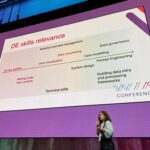Recap of KMS Technology’s Are you Blockbuster or Netflix? Enhancing EBITDA with Generative AI Webinar
At KMS Technology’s recent webinar Are you Blockbuster or Netflix? Enhancing EBITDA with Generative AI, we took a deep dive into the exponential growth of GenAI and addressed the challenges and opportunities this technology has to dramatically impact business performance. Industry experts explored the rapid evolution of AI and the competitive landscape, offering actionable insights on how organizations can leverage the technology to boost efficiency and enhance EBITDA.
Meet the Speakers:
- Milan Luketic – Solution Architect
Milan is a current Solutions Architect and AI Practice Lead at KMS Technology with vast experience in implementing innovative technology solutions. He extensively utilizes and consults on emerging technology, machine learning, and generative AI.
- Kim Mirazimi - Chief Revenue Officer
Kim leads Business Development and Revenue Growth at KMS Technology, leveraging over 20 years of experience navigating the ever-changing tech industry.
Here’s a recap of the key points discussed during the panel discussion:
1. Deep dive into the rise of GenAI: Understand its place in the technology landscape and its transformative potential.
Milan Luketic, a seasoned AI expert, delved deep into the rapid expansion of generative AI, a thriving technology experiencing exponential growth.
“The processing power over time is not linear, but exponential. AI capabilities have progressed over time relative to human parity starting in the beginning of the first AI, it took us about 12 years to apply AI to handwriting recognition. Image recognition took half that time – six years, and reading comprehension took a couple of years. So you could see in the last few years the explosion of the capabilities around co-generation, reasoning, and just knowledge so to completing exams and things like that. What’s coming for us is how fast can AI do video comprehension and watch a video, fully describe what’s happening which we’re already seeing early versions of that. This is all happening very fast”
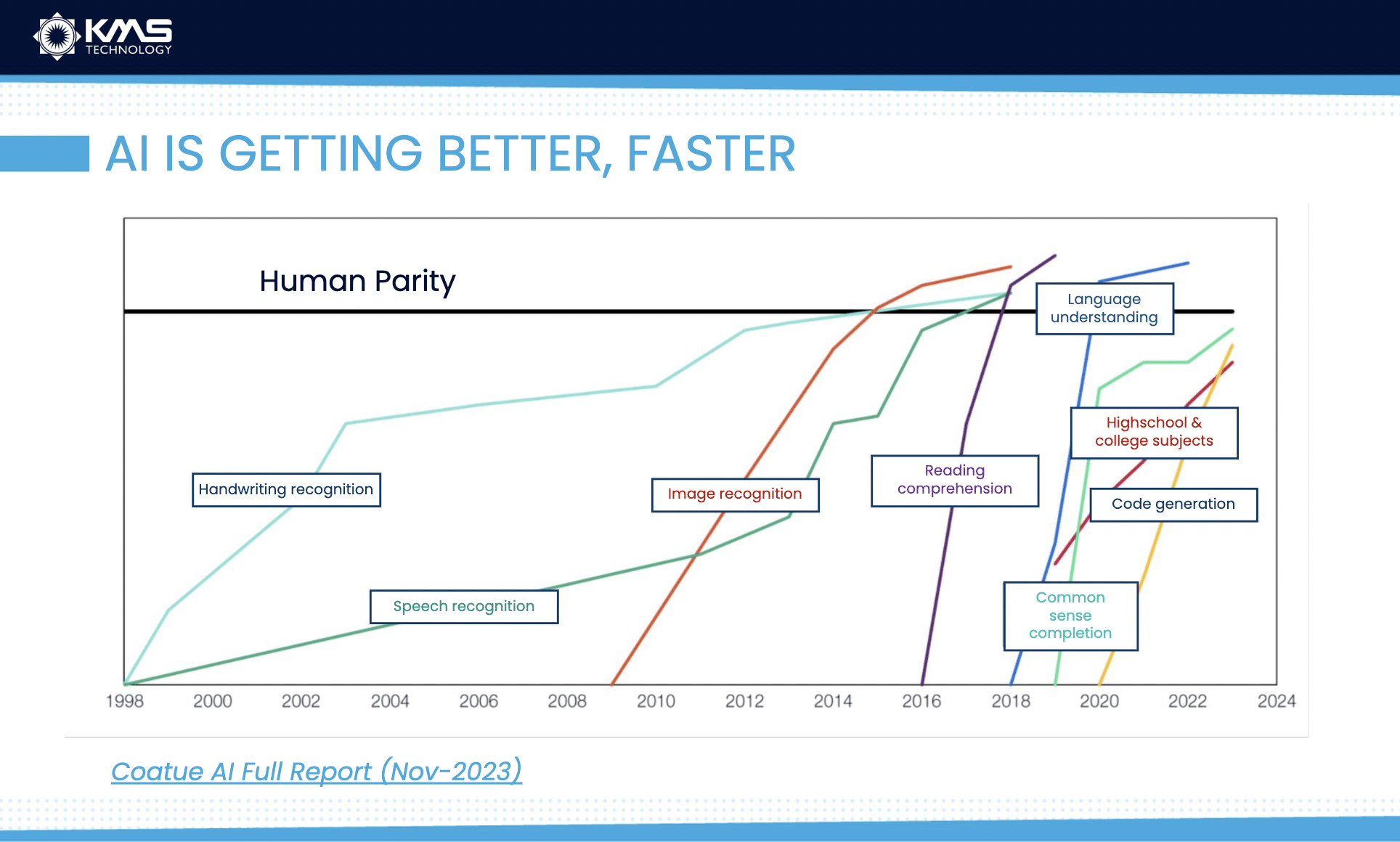
“In no more than 3 years, anything that is not connected to AI will be considered broken or invisible. – Microsoft”, he said, quoted Microsoft.
Milan highlighted the rapid surge in AI dependency, similar to the Internet but at a much faster rate which started in the 90s but wasn’t fully adopted until the early 2000s. With this change comes a change in customer preferences. Companies that fail to adapt to this change will suffer and fall behind the competition. A classic example was Blockbuster, which failed to act on the digital experience that was brought on by the internet.
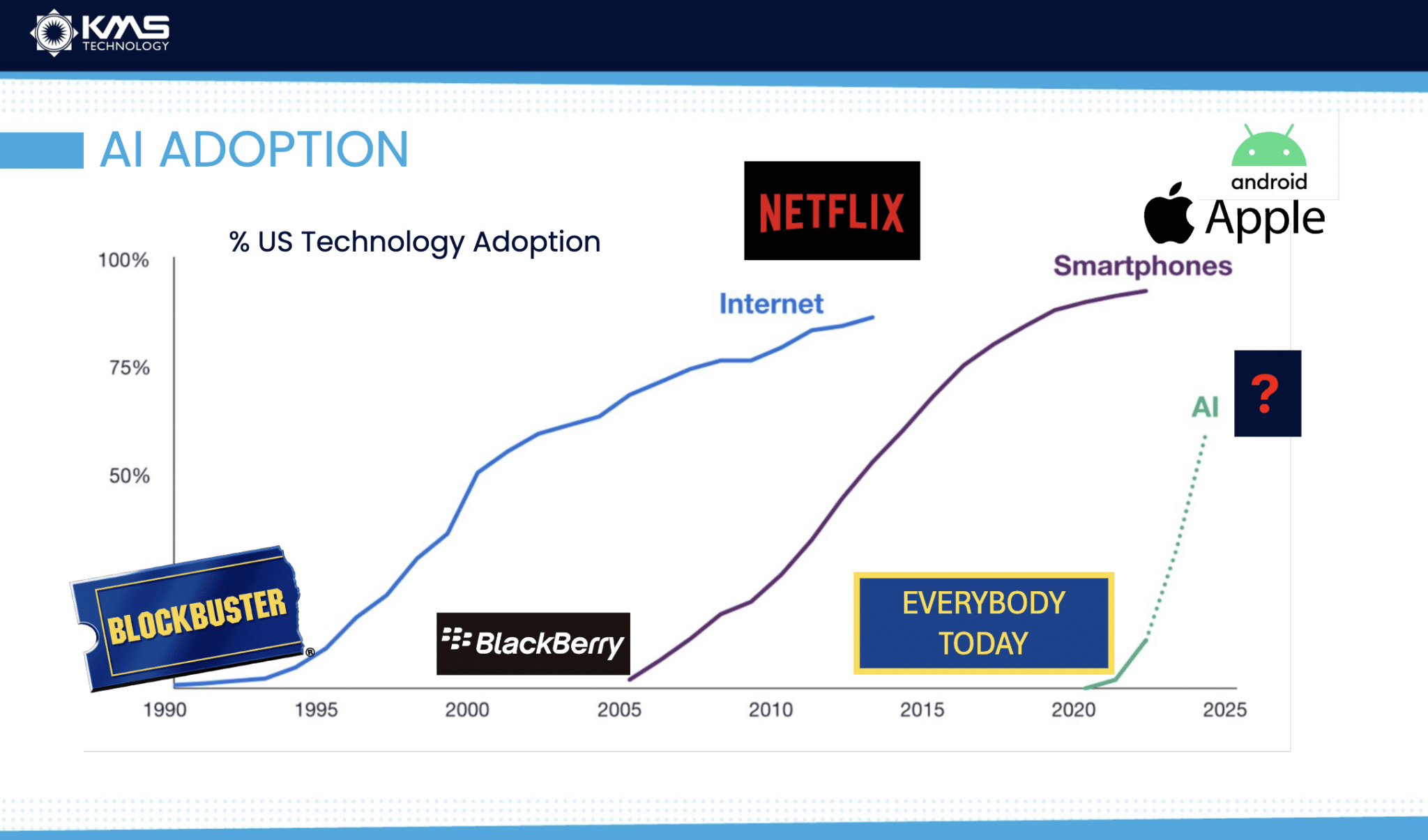
“We have to ask ourselves at the beginning of this genAI revolution: Who are the Blockbusters and who’s going to be the Netflix at the end of it”
2. EBITDA enhancement beyond efficiency
Kim Mirazimi, our Chief Revenue Officer explored how can organizations leverage AI to enhance positive outcomes for their EBITDA (Earnings Before Interest Taxes Depreciation, and Amortization) by revolutionizing market strategies including market development, market penetration, and market diversification.
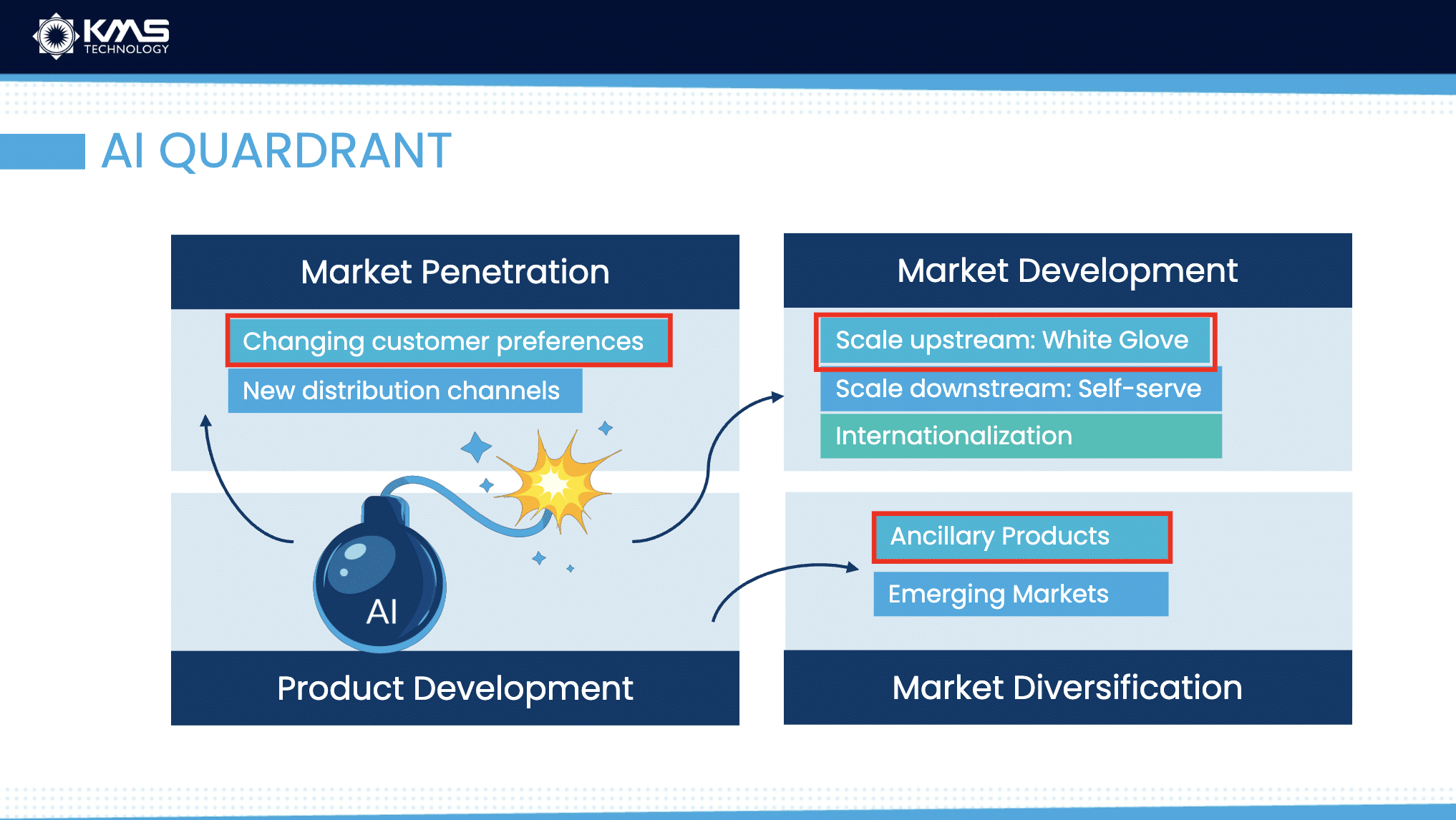
“With Market Development, this is the same service such as engineering or consulting but to a new market segment, this can focus on many areas of the Market segmentation”, Kim explained. “AI can allow you to service a company outside of your segment, which may expect a higher level of service. With GenAI they were able to deliver the work of a team triple its size in a much shorter period, think about that.”
Turning to market penetration, she underscored the importance of adapting to evolving customer preferences.
“This is where Blockbuster failed, it neglected to recognize the rapid adoption of the digital experience by its customers. Netflix did recognize it.”
“Another notable one here in Market penetration is where the taxi industry underestimated the adoption of digital experiences by its customers, Uber surely didn’t underestimate it and it rose very swiftly to where it is today.”
Mirazimi also highlighted market diversification as a growth avenue.
“Blockbuster missed the mark again here they neglected new ventures like content creation, live streaming, or maybe music but in contrast, Netflix embraced these opportunities they’re now producing movies and streaming live events I think the most notable of late was the Tom Brady roast.”, she said citing Netflix’s success in content creation and live streaming compared to Blockbuster’s missed opportunities.
Moreover, with AI on their side, businesses can be confident in exploring new opportunities that go beyond operation efficiency and looking at how to enhance growth strategies.
“We’ve now looked through a little bit and given you a snippet into a modern lens on how AI can trigger the explosion of product development with these types of strategies. With generative AI, you’re not linear, you’re exponential and it’s how we apply this to the bottom line that will be paramount”
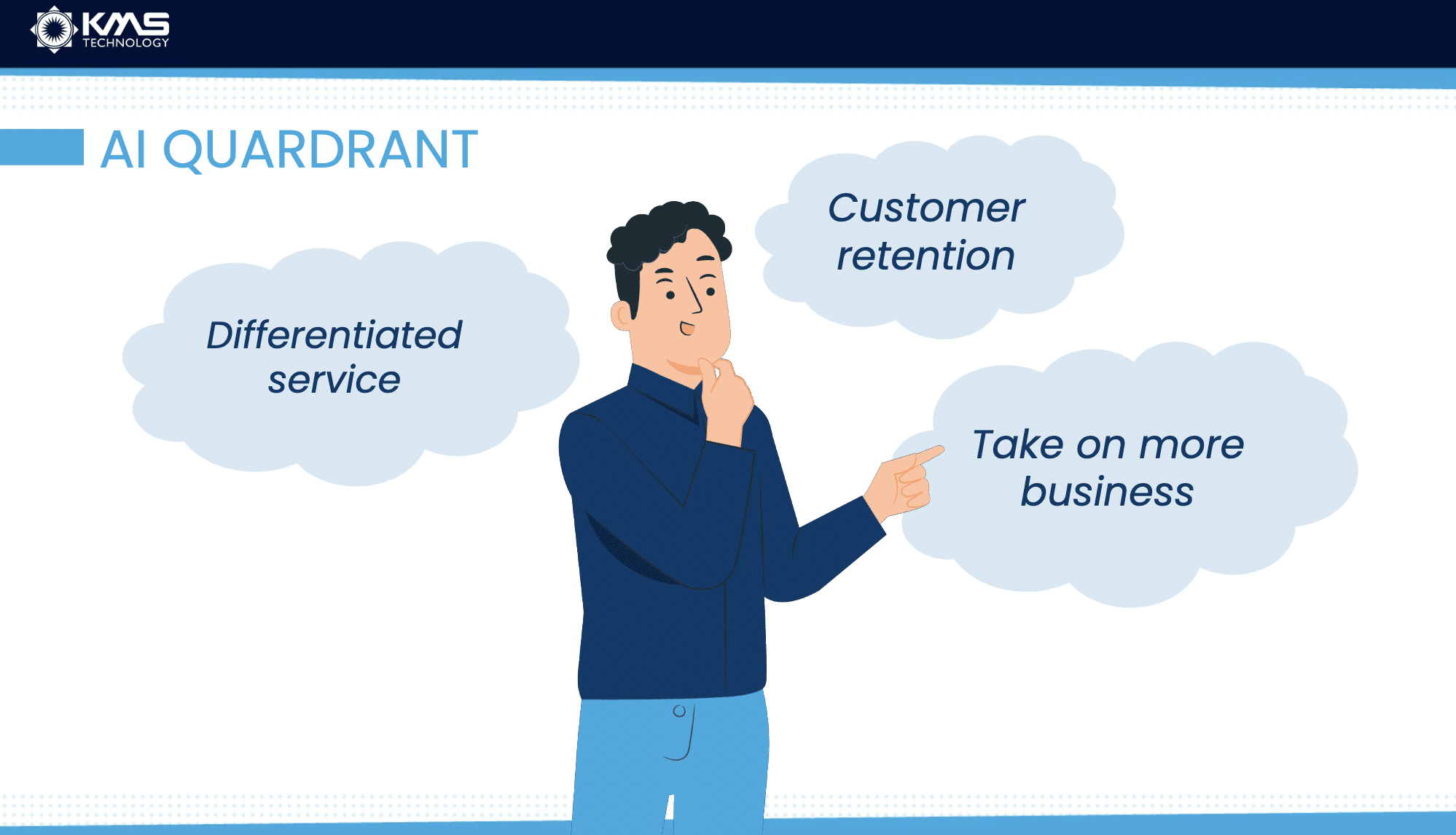
“Through Market development, Market penetration, and Market diversification, you can deliver differentiated services to customers that you may not have been able to deliver before you’re going to be able to ensure greater customer retention by fulfilling demands that were previously too complex to fulfill and one of my favorites take on more business, start saying yes to business that you would traditionally have had to decline.”
3. Roadmap Implementation: Gain insights on developing and executing a successful GenAI strategy for your organization.
Milan stressed the importance of developing a roadmap to navigate the rapidly evolving landscape of AI, providing valuable insights on how to build an effective roadmap starting by identifying and understanding upcoming AI technologies like superintelligence, agent communication, and digital twins.
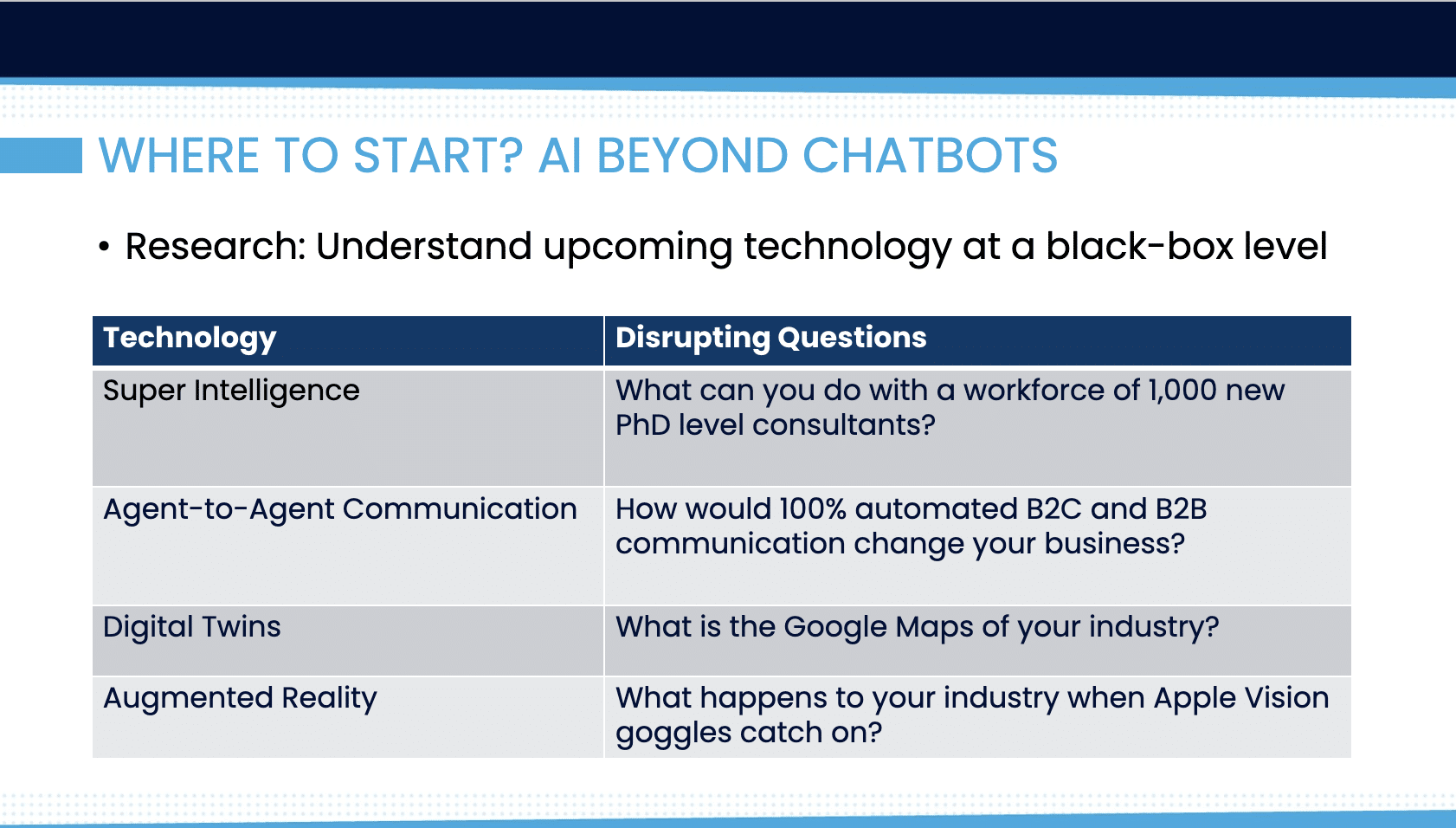
One of the key points is to think big and act fast. Don’t underestimate the pace of AI development and explore how these technologies can fundamentally change your industry. While acknowledging potential risks like data limitations and AI bias, also be confident in the rapid progress being made to address them.
“My biggest advice is to think big and then think even bigger. What I’m seeing is that through the road mapping process, people are focusing on the short-term, and medium-term and they’re struggling to understand the potential impact of the technology that’s coming and how fast. They’re thinking that things are going to happen in ten years when they’re really going to happen in three”
Instead of a single linear plan, Milan suggests creating multiple roadmaps focusing on different themes like “The Next Netflix” (industry disruption) or “Table Stakes” (keeping up with competitors). These roadmaps should be discussed and combined into a unified plan that addresses the organization’s key priorities.
4. How a partner can help
Having a strong partner can be instrumental in your AI journey. Here’s how:
- Coaching and Guidance on Advanced Technologies: Many teams struggle with AI initiation. A partner can provide expert guidance, expand your team’s thinking, and prepare them for strategic roadmap discussions. Moreover, a partner can help you uncover hidden data potential, often finding valuable resources you didn’t know existed.
- Data Assessment and Strategy: Often, businesses underestimate their data readiness. A partner can accurately assess your data, identify gaps, and devise a strategy to optimize its use for AI applications.
- Risk Mitigation and Roadmap Development: The AI field is rapidly evolving. A partner can help you identify potential risks, prioritize technologies, and create a phased implementation plan based on your business objectives and budget.
- Technology Optimization: With numerous AI options available, selecting the right tools can be challenging. A partner can help you avoid redundant investments, optimize technology choices, and ensure they align with your overall strategy.





